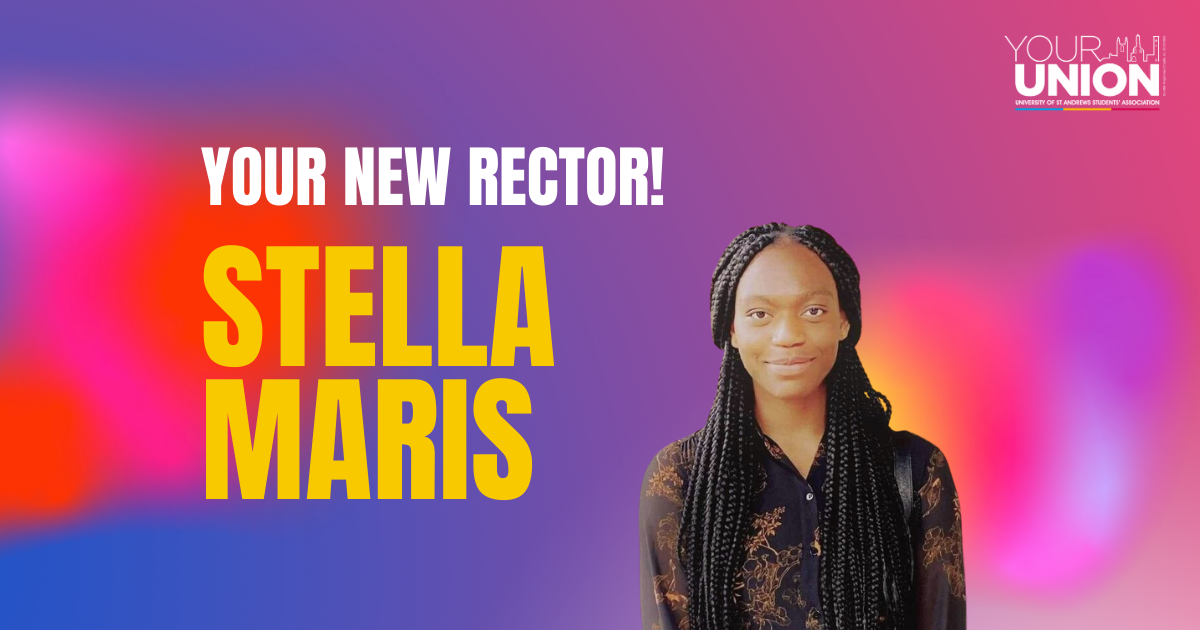
Three candidates were been nominated by students: Mark Brunner, Jonathan Edwards and Stella Maris. We are happy to announce that Stella Maris has been elected as your new Rector of the University of St Andrews!
2023 Candidates
Mark Brunner
Read Mark's Manifesto here.
Mark Brunner is a proud father to a St Andrews graduate, travels frequently to the university, and has lectured at the School of IR and the Lafayette Club. He is currently the President of PrimerAI, a leading global technology company. Mark is leader in career development for early career and university graduates and will transform the St Andrews internship and career office services by raising the University's profile with global companies and institutions who will benefit from hiring graduates from the #1 ranked UK university. St Andrews' students deserve nothing less.
In tandem with his focus on elevating the career office to achieve its own #1 ranking for student services, as Rector, Mark would accelerate sustainability initiatives at St Andrews. He led the National Commission on Energy Efficiency and was inducted into the "Energy Efficiency Hall of Fame" in recognition of his sustainability efforts, including several initiatives that were voted into law. Mark believes St Andrews can pursue a more ambitious approach to energy efficiency and leverage technology to achieve their 2035 energy and water efficiency targets.
With respect to DE&I, Mark would work closely with the Universities Equality, Diversity, and Inclusion (EDI) team and maintain transparent dialogue with students on key priorities while welcoming new ideas.
Jonathan Edwards
Read Jonathan's Manifesto here.
Jonathan Edwards is one of Britain's most successful ever athletes . During his career as a professional triple jumper, he won the Olympic gold medal in Sydney 2000 and set the world record for the men's triple jump- a record that still stands 28 years on. After his retirement from professional athletics, Jonathan went on to be the athlete representative on the Organising Committee Board for the London 2012 Olympic and Paralympic Games, where he was instrumental in establishing structural change to provide athletes with a stronger voice.
In addition to this, he was the Deputy chair of the Nations and Regions group that was established to grow the impact of the games to a wider and more inclusive audience. He has a wealth of experience representing the concerns of others and representing the issues that matter most to them at the very highest level. In his broadcasting career, Jonathan was part of Channel 4's groundbreaking coverage of the Paralympic Games and has recently been appointed as a charity trustee of the Invictus games foundation- a charity dedicated to supporting wounded, injured and sick veterans.
Jonathan's first introduction to the St Andrews student community came in 2011, when his eldest son began studying here. He would be honoured to be elected our Rector and have the opportunity to bring both his professional experience and personal dedication to this historic role and help give students the best possible time here.
Stella Maris
Read Stella's Manifesto here.
As the former Rector's Assessor, a role I held for the past two and a half years, I am intimately familiar with the role of Rector and its relationship with both the students and the upper echelons of University Staff. This experience, combined with my time as the Senior Student of St Salvator's Hall and my term as Class representative for two departments, qualifies me to be the Rector of the University of St Andrews.
I'm committed to enhancing the relationship between the student body and the university, particularly senior leadership. In my tenure as Rector's Assessor, I worked to boost the Rector's Fund, ensuring more students can afford invaluable work experience. I've also highlighted the importance of standing up for LGBTQIA+ members, so their experiences and expertise drive discussions. Moreover, I plan to tailor university resources and support mechanisms to meet the needs of Saints who struggle with disabilities, mental health concerns, or other external factors, such as being young carers. The emphasis on 'International Student Integration' stays prominent, with a mentorship program that eases the transition for international students and fosters a true global community. On accommodation and affordability, I'm pushing for more transparency, addressing rising living costs and striving for a fairer deal for all students. My focus lies in promising every Saint, irrespective of background, feels at home here. Together, we can build a St Andrews that's not just a place of learning but a community that stands united in its diversity and strength.
What is the Rector?
The Lord Rector of the University of St Andrews is the President of University Court, and plays an informal, pastoral role for students. Since 1858, the Rector has been elected by students every 3 years. The role is completely independent and external to the University, and represents the student community in the University’s major decision making committees.
Court is the highest governing body of the University. It exists to oversee the management of our institution, with special emphasis on strategic leadership and accountability. The Principal leads the actual management of the University, but they are accountable to Court, which comprises senior staff and a majority of unpaid, external, independent 'lay' members, meeting about four times a year. Court is the place where many University issues are decided: budget allocations, financial policies, academic policies, estate development and capital projects, staff and student provisions.
The Rector can open doors and release log-jams where the formal mechanisms for resolving issues appear to fail. A Rector with the time, sincerity and commitment to get to know the student body and engage with their issues, and the skills to influence effectively, can make a uniquely valuable contribution to the student experience, as well as to the life and reputation of the whole University.
Rectorial Election Handbook
A full handbook with information on the Election Rules, as well as a thorough description of the role of the Rector and the prescribed nomination form is available here.